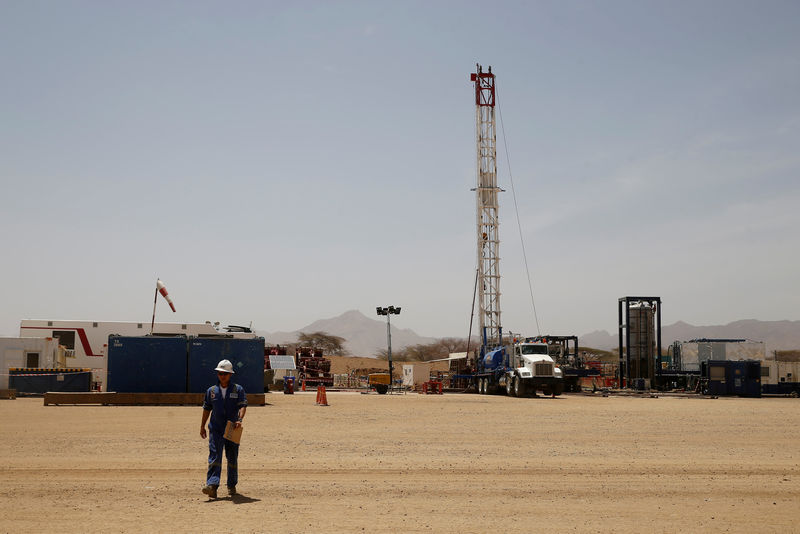By Shadia Nasralla
LONDON (Reuters) - Investors have sent shares in European oil exploration and production (E&P) focussed companies like Premier (L:PMO), Tullow (L:TLW), EnQuest (L:ENQ) and Faroe (L:FPM), soaring, and some fund managers say they have not peaked yet.
Shares in smaller and mid-cap British oil companies are outperforming the London FTSE blue chip index (FTSE) and their larger competitors (SXEP), riding the wave of rising oil prices (LCOc1) much higher than oil majors.
"The sector has performed quite well, but not as well as it might have done, we've only just started the rally," said Paul Mumford, senior fund manager at Cavendish Asset Management, who is invested in Faroe, EnQuest, Tullow, Hurricane Energy (L:HUR) and Cairn Energy (L:CNE) and other smaller E&P groups.
"I tend not to do majors. You're not going to make ten times your money with BP (LON:BP) and Shell (LON:RDSa), whereas with some of the (smaller companies) you will do that. It's a very interesting undervalued part of the market."
Smaller E&P companies have direct exposure to oil prices, reflected in benchmark Brent futures which have risen by around a quarter towards $80 a barrel in the past three months, levels last seen in late 2014.
Morgan Stanley (NYSE:MS), which sees oil prices rising to $90 a barrel in 2019/20, said in a note this week it was "time to increase E&P exposure", raising E&Ps' rating to attractive.
An index of 20 larger European oil and gas companies - most of which include refining and marketing operations known as downstream - rose by around a fifth in the past three months.
Meanwhile, pure E&Ps like Premier rose by around 60 percent, Tullow by 50 percent, Faroe by 40 percent and EnQuest by almost 30 percent. An index of smaller oil and gas groups rose by around 35 percent <.TRXFLDEUPUOILE>.
Low oil prices hit E&Ps harder than so-called integrated oil companies like the majors, whose downstream activities worked as a natural hedge when oil prices slumped starting in 2014.
With projects planned at a time of high oil prices, balance sheets came under pressure and debt mushroomed.
"Our sector has been unloved for a long time," said Nathan Piper, who analyses mid-level oil companies for RBC. "Now they are (loved) - with some of these companies, which people thought would go out of business a couple of years ago, recovering."
When oil prices were low, cost cuts and asset sales were the main way for companies trying to juggle rising debt, operating expenditure and lower revenues. Higher oil prices will allow debt piles to shrink faster - a focus for investors.
Barclays (LON:BARC) said this week that higher oil price assumptions had led it to raise 2018-20 "cash flow and price targets across our coverage group, with debt-levered oil producers benefiting the most. Current positive momentum is encouraging investors to revisit the sector."
Tullow, with debt still at $3.4 billion, announced last month it swung back to profit after three years in the red, and is considering resuming dividend payments frozen in 2015.
British-based companies can carry forward tax losses, allowing groups to offset rising revenue in high-price periods against previous years' losses - a double advantage for oil companies solely or mainly operating in Britain.
EnQuest, which is saddled with around $2 billion in debt, had corporate tax losses of over $3 billion at the end of 2017 so it will most likely not pay any material corporate tax on British operations for "the foreseeable future", a spokesman said.
Premier, carrying $2.7 billion in debt, had $4 billion of UK tax losses and allowances to carry forward. It is ramping up its Catcher oil field and looking to expand in Mexico.
Premier Chief Executive Tony Durrant told Reuters investors are starting to realise the sector is undervalued and that he sees rising interest from generalist fund managers:
"Investor sentiment towards the sector is only just recovering. We were hit very hard on the downturn because we were leveraged. The logic is we've got further to go on the way back up. Over the coming weeks you'll see some disclosable interest from some quite large institutional shareholders."
But some investors are more reserved. Allianz (DE:ALVG) energy analyst Rohan Murphy said he would like to see E&P companies' valuations underpinned by more mergers and acquisitions and oil futures prices going up to signal the oil price rally has longer to run.
(European oil exploration and production shares May 16: https://reut.rs/2ImaUPx)

(E and P stocks versus sector: https://reut.rs/2wMxyvl)